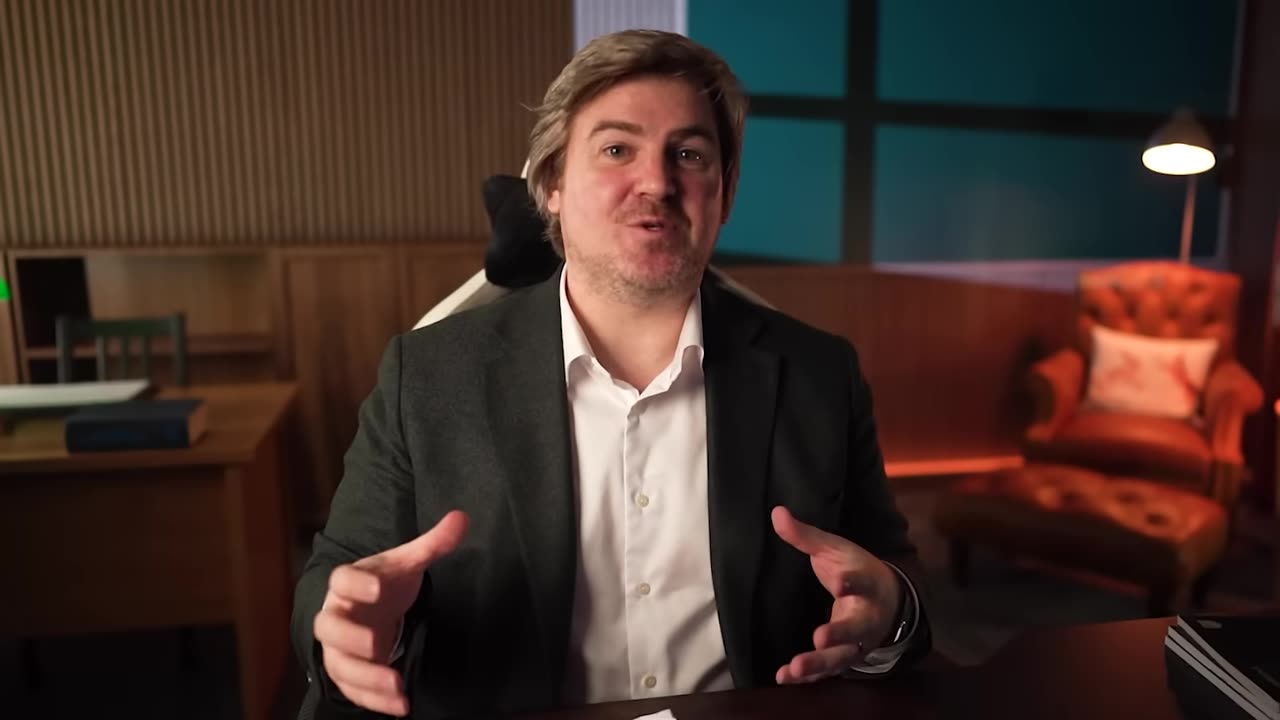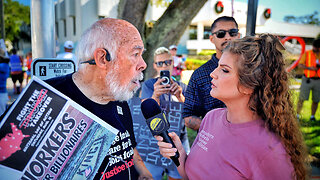Premium Only Content

IELTS Speaking– Most Common Ways to Start Your Answer
IELTS Speaking– Most Common Ways to Start Your Answer
0:00 today I'll reveal the most common ways B
0:02 78 and N students begin their answers in
0:05 the speaking test we've analyzed all of
0:07 our highlevel speaking performances to
0:09 find out exactly which openings work
0:12 best so that you can improve your score
0:14 I've also put this into an ebook for you
0:17 and you can download that at the end so
0:19 in the ielt speaking test examiners ask
0:21 various question types such as
0:23 preferences opinions past experiences
0:26 hypothetical questions and many many
0:28 more we'll explore each category in this
0:31 short quiz so you'll see exactly how
0:34 high level candidates typically start
0:36 their answers ready let's begin question
0:39 one when asked about preferences for
0:42 example do you prefer to study in the
0:44 morning or at night which of these
0:47 openings is the most common most are
0:50 high level candidates a yes definitely I
0:54 prefer morning because it's quieter B
0:57 I'd say I generally prefer mornings
0:59 simply because C actually my preference
1:02 changes all the time so it depends or D
1:06 I used to prefer mornings but not
1:17 anymore I'd say I generally prefer
1:20 morning simply because so in our
1:22 analysis 37% of B 78 and9 students start
1:27 preference answers with a short Direct
1:29 direct modal statement like I'd say I
1:32 generally prefer or I'd rather this
1:35 approach shows Clarity and immediate
1:37 focus on the answer so for preference
1:40 questions start it with a direct answer
1:43 and then follow it up with a little
1:45 explanation question two when asked for
1:48 an opinion for example do you think
1:50 children should learn to cook at school
1:53 which is the best opening a yes I
1:56 completely agree the children should B
1:59 actually in my opinion it depends on C
2:02 no because I think cooking is a waste of
2:04 time or D well I'm not entirely sure but
2:08 I guess
2:18 Yes actually I think in my opinion it
2:22 depends on so actually in my opinion it
2:24 depends on is the most commonly used
2:27 Approach at this level for opinion-based
2:29 ERS people normally start with a filler
2:32 like well or actually and then they
2:34 clearly State their opinion so they say
2:37 I think or in my opinion sounds more
2:39 conversational and it's just a direct
2:42 way of opening this type of answer
2:45 question three for a past experience
2:47 question for example describe a time
2:49 when you traveled somewhere new which
2:52 opening is the most common a I used to
2:55 prefer traveling in groups but now I go
2:57 alone B well I remember last last year I
3:00 visited C yes traveling is amazing I
3:03 think I prefer D actually I'm not sure
3:06 maybe next time I
3:16 will I remember I was very young when I
3:19 watched it and uh so answer B well I
3:22 remember last year I visited matches a
3:24 narrative past orientated question over
3:27 60% of band 7 answers to describe a Time
3:31 questions began with a direct recall
3:34 statement like I remember or it happened
3:37 when or back in 2019 this clarifies that
3:40 you're shifting into story mode and you
3:43 have answered the question and you know
3:45 exactly which tense or structure to
3:48 answer the question with so a really
3:49 good tip is to think about the question
3:52 that is being asked and think about the
3:54 tense or grammatical structure that
3:57 could easily answer that question so if
4:00 they ask you to recall a story you're
4:02 going to be using this type of phrase
4:04 like I remember or back in 2019 that
4:08 instantly tells the examiner not only
4:10 this person has understood what I have
4:12 said but they know the correct grammar
4:14 the correct structure to answer the
4:16 question hey so hope you're enjoying the
4:18 video if you want a more extensive
4:21 speaking course that covers much much
4:23 more we have our free speaking course
4:26 you can download it by just clicking the
4:28 link in the description question four
4:31 for a hypothetical question for example
4:34 if you could live in any City where
4:35 would you choose how to high level
4:37 candidates typically begin their answers
4:41 a I definitely live in London because
4:43 it's vibrant B I will live in London
4:46 because it is vibrant C I would probably
4:49 choose London because it's vibrant D I
4:52 choose London because it was vibrant
5:04 I would probably choose London because
5:07 it's more vibrant so answer C is correct
5:10 for a hypothetical situation our data
5:13 shows roughly 55% of B 7 8 and N
5:16 speakers use would plus a verb to
5:20 indicate an imaginary scenario an
5:23 accuracy and appropriacy are crucial
5:25 here so again make sure that your
5:27 grammar fits the situation that actually
5:30 talking about when we're talking about
5:32 an imagined or unreal situation we're
5:34 going to be using these type of
5:36 grammatical structures always be
5:38 thinking of these on test day but a
5:40 better way of doing it is to think about
5:43 these when you're practicing and listen
5:45 back record yourself listen back to the
5:47 actual grammatical structures that you
5:49 use for the different types of question
5:51 and then you won't have to think as much
5:53 on test day you will use these more
5:55 naturally question five it depends
5:58 questions so when you're unsure or you
6:01 can talk about multiple sides which
6:04 opening do you think would be best a
6:07 well it depends on the person because B
6:10 I think I can't decide C it's definitely
6:13 always x d I have no
6:26 idea well it depends on the person
6:29 because
6:30 the phrase it depends was find in 31% of
6:34 high-scoring answers for comparative
6:37 type questions because it shows you're
6:39 able to consider both sides examiners
6:41 are listening out for a balanced
6:43 approach rather than you just giving an
6:45 extreme short answer so if the examiner
6:48 asks you about something where there are
6:50 two sides a really easy way of answering
6:54 that question is just to think of each
6:56 side and say it depends some people
6:59 think this some people think that and
7:01 then you can also round It Off by giving
7:03 your personal opinion or you can use the
7:06 little useful word if if I was this
7:09 person or if I was in this situation
7:12 again very very easy simple way of
7:14 showing the examiner that you are not
7:17 only balancing your answers but fully
7:19 developing your answers this is
7:21 particularly useful in part three
7:24 question six so for simpler part one
7:27 questions these are normally asking you
7:29 just personal basic questions getting to
7:31 know you chitchat type questions which
7:33 of these Beginnings is the most
7:35 effective a i hail from a place that is
7:38 widely considered B to be perfectly
7:40 honest I can't recall C I live in
7:43 Manchester and it's quite D there's a
7:46 certain logic to that
7:56 question I live in Manchester and it's
7:59 quite
7:59 so answer C I live in X is the right fit
8:04 for a quick direct part one answer over
8:08 65% of bond 8 and N students keep part
8:11 one answers very simple and
8:13 straightforward I live in X I work as y
8:17 i study at Zed this direct Clarity is
8:20 really valued by examiners one of the
8:23 worst mistakes that you can make is
8:25 starting part one with over complicated
8:28 answers because they're not complicated
8:31 questions they're like do you work or do
8:32 you study where do you live asking what
8:35 you do on the weekend if in real life
8:37 you were asked those questions how would
8:39 you answer them just using simple direct
8:42 language if you do that the examiner
8:44 knows that you're not trying to cheat
8:46 the test or you haven't been maybe
8:48 taught by someone who is teaching you to
8:51 sound more complicated than the test
8:54 really needs to be you can get a little
8:56 bit more complicated in part two and
8:58 part three but for most questions in
9:00 part one this type of answer is the best
9:03 and of course you can develop it more
9:05 fully after you've directly answered the
9:08 question but just answer the question
9:10 thanks for making it this far in the
9:11 video to thank you I want to give you
9:13 10% off our VIP course the VIP course is
9:16 the most successful is course in the
9:18 world we have more success stories than
9:20 anyone else that's a fact that you can
9:22 verify on our website it's the fastest
9:24 most complete way to get the score that
9:26 you need to help you out I've given you
9:28 10% off Link in the description question
9:31 seven so we're getting a little bit more
9:32 complicated now for a deeper part three
9:35 question such as why does some people
9:38 choose to live in cities rather than
9:40 rural areas which is the ideal opening a
9:43 yes I completely agree with that B it's
9:46 possible that people enjoy C I used to
9:49 prefer Rural Life D that's an
9:51 interesting question I think some people
9:53 enjoy the convenience While others
10:05 that's an interesting question I think
10:08 some people enjoy the convenience While
10:10 others are so answer D includes a short
10:13 bridging phrase that's an interesting
10:15 question plus an opinion or an
10:17 explanation 46% of our top scorers open
10:20 part three answers by acknowledging the
10:23 complexity that's a tough one that's an
10:25 interesting question and then moving in
10:28 to a more balanced explanation and part
10:31 three demands a bit more analysis
10:34 quickly acknowledge the question's
10:36 complexity by putting in one of those
10:38 phrases and then transition into your
10:40 Viewpoint with reasons and examples
10:43 don't think that you can just say hm
10:45 that's a tough question and the examiner
10:47 will be like band nine these are just
10:49 remember the start of the questions so
10:52 how are you doing so far let's move on
10:54 to question eight when you have to
10:57 provide a personal example for example
11:00 can you give an example of when you
11:01 learn something new which start is more
11:04 typical for our band 78 and N candidates
11:08 a certainly for example last year I B
11:12 it's interesting I think in the future C
11:15 I would like to summarize by saying D I
11:18 have no example for
11:26 [Music]
11:28 that uh certainly for example last year
11:31 I so answer a certainly for example is a
11:35 simple direct lead in to a short story
11:39 or anecdote around 39% of our successful
11:42 speakers used a quick bridging word like
11:45 sure certainly actually Plus for example
11:49 before diving into the personal story so
11:52 a really good tip is to always think
11:53 about how you would answer these
11:55 questions if you were in a coffee shop
11:57 with your friend if I was in in a coffee
11:59 shop with my friend and I said have you
12:02 watched any good TV shows recently if
12:05 they immediately responded with for
12:08 example I watched The Sopranos last
12:11 night no one would ever answer it like
12:14 that that is why more high level
12:15 speakers will add in one of these little
12:18 phrases sure let me think yeah for
12:20 example I was watching The Sopranos last
12:23 weekend the first time I've seen it it's
12:25 it's amazing uh and then talk about the
12:27 characters or why you like it or blah
12:28 blah blah examiners are not testing you
12:31 on academic English what they want to
12:33 know is can you move to New York London
12:36 Sydney and speak to people not can you
12:40 speak like a robot giving memorized
12:42 answers thank you so much for watching
12:43 this video as promised I've put
12:45 everything into an ebook for you you can
12:48 find it and download it for free in the
12:51 description question nine the last one
12:54 what if you're asked something and you
12:56 don't really know much about that topic
12:58 you're unsure how to ask which is not
13:02 recommended a I'm not entirely sure but
13:05 if I had to guess B that's a tricky one
13:08 it might depend on C I don't really know
13:11 exactly yet I suspect or D I've no idea
13:15 next
13:18 [Music]
13:24 question I'm not entirely sure but I
13:27 guess answer d is obviously not
13:30 recommended but you would not believe
13:32 the number of candidates that when they
13:35 get a difficult question in part three
13:37 they just refuse to answer the question
13:39 or they say nothing or they start
13:41 laughing maybe because they're a little
13:42 bit nervous but if you do that on exam
13:45 day what you were telling the examiner
13:47 is I don't have enough English to answer
13:50 this question not I don't have enough
13:52 content or I don't have enough ideas
13:55 every strong candidate that we worked
13:57 with attempts an answer even if they are
14:00 uncertain for example they might say I'm
14:03 not entirely sure but or it depends on
14:07 90% of our band 7 8 and N students at
14:11 least try to give an opinion that is
14:14 telling the examiner one crucially
14:16 important thing you might not have
14:18 enough knowledge to talk about this
14:20 topic you might be unfamiliar with it
14:23 but you have enough English to explain
14:25 and speculate and guess about the topic
14:28 remember it's not an IQ test it's not a
14:30 Knowledge Test it's a test of English
14:33 communication so remember the key to
14:36 strong I speaking answers is appropriacy
14:39 which means choose the best opener for
14:42 the specific type of question stay
14:44 accurate and be natural thanks for
14:46 watching if you want more help with
14:48 speaking this is a great video or if you
14:50 just want to have fun and improve your
14:53 speaking at the same time check out this
14:55 quiz
-
 19:31
19:31
Liberty Hangout
3 days agoAnti-Trumpers Repeat CNN Talking Points
185K217 -
 19:53
19:53
Clintonjaws
3 hours ago $0.77 earnedThey Lied About Charlie Kirk - MAJOR UPDATE
5.74K10 -
 LIVE
LIVE
Midnight In The Mountains™
48 minutes agoArc Raiders w/ The Midnights | THE BEST LOOT RUNS HERE
85 watching -
 LIVE
LIVE
ladyskunk
1 hour agoBorderlands 4 with Sharowen Gaming, Rance, and Sweets! - Part 8
58 watching -
 LIVE
LIVE
S0lidJ
2 hours ago🟢Live -S0lidJ - Solos Arc Raiders
110 watching -
 5:46:19
5:46:19
TheItalianCEO
6 hours agoSunday is for chill games
8.6K -
 10:24
10:24
AlaskanBallistics
18 hours agoDiscovery Optics 1-8x28mm LPVO Riflescope Review
8.78K -
 2:08:24
2:08:24
Jeff Ahern
4 hours ago $8.17 earnedThe Sunday Show with Jeff Ahern
18.9K6 -
 27:41
27:41
DeVory Darkins
1 day agoMarjorie Taylor Greene STUNNED after Trump pulls her endorsement
46.5K329 -
 5:06:28
5:06:28
ttvglamourx
6 hours ago $1.14 earnedSUSSY SUNDAY !DISCORD
12.1K